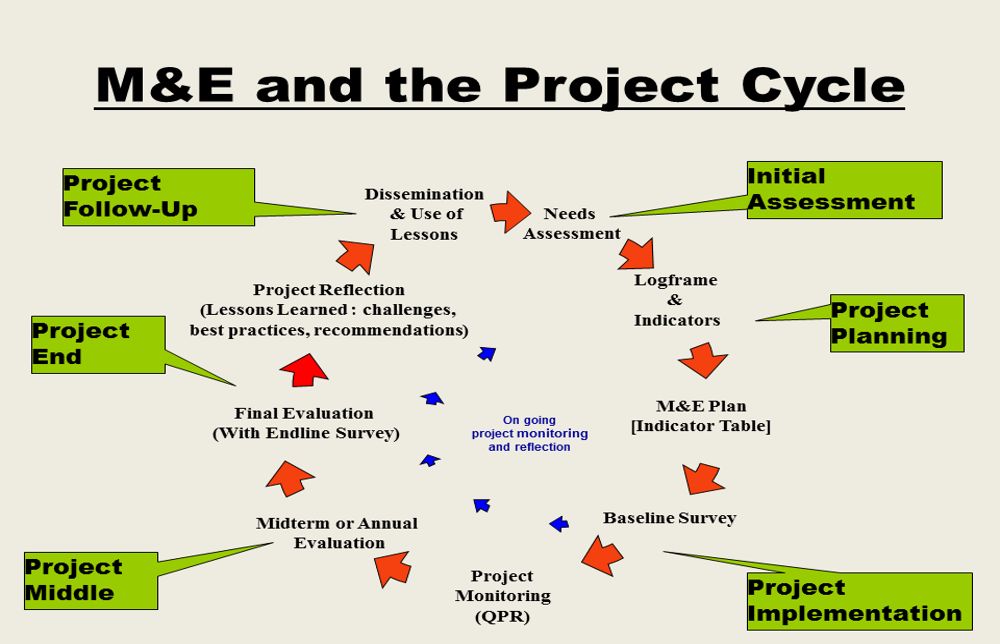INTRODUCTION
Developments projects need continuous tracking in addition to periodic assessments in order to be effective and efficient. Donors, stakeholders, project implementation team, beneficiaries and general publics require constant feed back on project performance. This project management, monitoring and evaluation course will be a blend of planning and management principles with related skill-development. Delegates will learn about the kinds of questions that should be asked when directing and reviewing the development of projects, as well as how to complete ‘due diligence’ in order to support the leadership to make informed and effective decisions. This course aims to equip delegates with the knowledge and expertise in Policy Development, Planning, Monitoring, Evaluation and Reporting which is critical to any organisation or government department involved in development projects and programmes or Policy related issues.
COURSE OBJECTIVES
Upon the successful completion of this course, you should be able to:
- Develop your own project cycle management from Action Plan to implement on-the-job
- Develop a Monitoring and Evaluation Plan for their projects
- Know when an evaluation should take place and by whom (participatory evaluation)
- Identify appropriate qualitative and quantitative data collection techniques
- Construct an evaluation report and terms of reference
- Understand and manage the policy consultation process
- assess policy documents and identify the difference between Broad Policy, Specific Policy and Operational Policy
- identify the factors that distinguish policy from an issue
- identify the roles of leadership and staff in policy development and implementation
- assess the relationship between values, decision-making and policy
- apply the Vision Approach and Problem Approach when assessing policy
- identify each stage of the Policy Cycle and evaluate each stage in the First Nations context
- Identify and develop risk factors and assumptions
COURSE OUTLINE
MODULE 1 – INTRODUCTION
- General Management
- Fundamentals of Project Management
- The Project Cycle Management
- Stakeholder Analysis
- Development projects and Donor Relations
MODULE 2: DEFINING THE CONCEPTS OF MONITORING
AND EVALUATION
- Origins of Programme Evaluation
- What is Evaluation?
- Need for Reliable Data
- Key Evaluation Issues
- Evaluation versus Social Science Research
- What is Monitoring?
- Steps in a Monitoring Process
- Role of Performance Indicators in Monitoring
MODULE 3: PROGRAMME PLANNING AND DESIGN
- Needs Assessment
- Baseline Assessment
- Conceptual Model as an Integral Part of Programme Design
- Establishing a Programme Theory
- Developing a Logical Framework
- Defining Goals and Objectives
- Impact Objectives
- Choosing Activities
- Identifying Indicators
- Process Indicators
- Results Indicators
- Criteria for Selecting Indicators
MODULE 4: PLANNING A USEFUL EVALUATION
- The Evaluation Process
- Types of Evaluation
- Cost-Benefit Analysis
- Cost-Effectiveness
- Comparing the two Concepts
- Evaluation Assessment
- Scope of the Evaluation
MODULE 5: EVALUATION DESIGN
- Experimental Design
- Non – Experimental Design
- Pre – Test and Post – Test Design
- Static Group Comparison
WHO SHOULD ATTEND?
Some ideal participants include but are not limited to:
- Construction Project Managers,
- Civil Engineers,
- Architects,
- Landscape architects,
- Contract Managers,
- Site Managers/Agents and Environmental Professionals.
- Anyone involved with designing, creating, operating, renovating and/or demolishing structures in the built environment will also highly benefit from this course.
TARGET COMPETENCES
- Applying sustainable construction principles
- Sustainable building design procurement and delivery
- Leadership in Energy and Environmental Design (LEED)
- Implementing environmental management systems
COURSE OUTLINE
-
- The case for sustainability in construction
- Defining sustainability and its benefits
- Origins of sustainability
- Sustainable development
- Current hot topics
- Climate change
- IPCC reports
- Water resources
- Soil erosion
- Raw materials
- Energy demand
- Legal framework
- Environmental/social governance
- Green growth knowledge platform
- Key focus areas (compliance)
- Air environment
- Water environment
- Hazardous materials
- Waste management
- Noise control
- Environment reporting
- Administration
- Enforcement
- Permitting
- Site visits/inspections
- Environmental Management Systems (EMS) in the construction industry
- Effective EMS and site controls
- EMS requirements – ISO 14001: 2004/15
- Background and context
- Key ISO elements
- Environmental aspects
- Policy
- Objectives and targets
- Programs
- Audits
- External validation
- Green Building Guidelines
-
- Urban connectivity
- Site
- Energy
- Water
- Materials
- Indoor/outdoor environment
- Cultural & economic value
- 5 focus areas
- Indoor environmental quality
- Water use and efficiency
- Energy efficiency
- Cooling systems
- Envelope efficiency
- Leadership in Energy and Environmental Design (LEED)
- LEED applicability
- Examples of LEED projects
- Core LEED elements
- Site selection
- Water efficiency
- Energy and atmosphere
- Materials/resources
- Indoor environment
- Innovation
- Building Research Establishment Environmental Assessment Methodology (BREEAM)
- Civil engineering
- Environmental Quality Assessment and Award Scheme (CEEQUAL)
- Sustainable building design and procurement
- Challenges faced
- Physical environment
- Fundamental design features
- Procurement
- Sourcing materials
- Sustainable suppliers
- Life cycle analysis
- Product selection
- Green Building Council (GBC)
- Championing sustainability at project level
- Sustainability Action Plan (SAP)
- The implementation challenge
- What will you do differently tomorrow?
-
- The case for sustainability in construction
VENUE:
- DUBAI, UAE
- CAPE TOWN, SOUTH AFRICA
- MAURITIUS
- TANZANIA
- NAIROBI, KENYA
- KUALA LUMPUR, MALAYSIA
REGISTRATION:
To register for this course please apply online at: www.dotrid.com/apply-online or complete and forward our nomination form obtainable via email from: info@dotrid.org or call +27215519023, You can also send an inquiry via:
WhatsApp:+27 604 253 288.
IMO: +27 604 253 288.
Telegram: +27 604 253 288.
COURSE DATES:
13-17 MAY, 2019
15 -19 JULY, 2019
16 – 20 SEPT 2019
7-11 OCT, 2019
4-8 NOVEMBER 2019
2- 6 DEC 2019
YOUR TRAINING INVESTMENT
The cost of your course depends on factors including the number of delegates, specific requirements and the location of your training.
Dotrid International Training Institute will provide a detailed and competitive quote following your initial enquiry.
Course Curriculum
Course Reviews
No Reviews found for this course.














